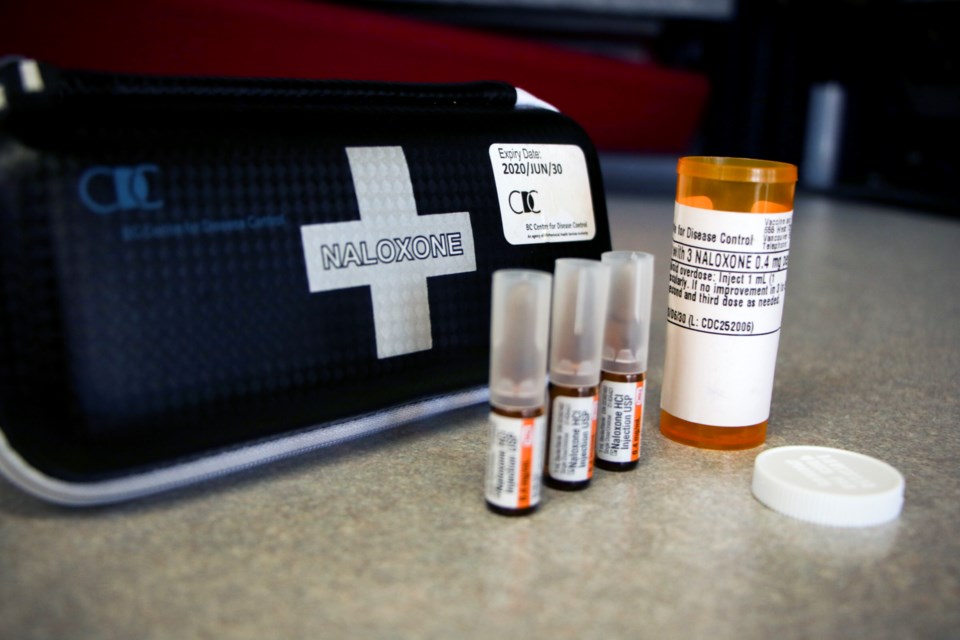New Westminster is calling on the federal government to help save lives by declaring the overdose crisis a national public health emergency.
On Monday night, city council approved a motion asking the federal government to immediately seek input from the people most affected by the crisis and to meet with the provinces and territories to develop a comprehensive, pan-Canadian overdose action plan. This would include comprehensive supports and full consideration of reforms that other countries have used to significantly reduce drug-related fatalities and stigma, such as legal regulation of illicit drugs to ensure safe supply of pharmaceutical alternatives to toxic street drugs, as well as decriminalization for personal use.
“What we are doing now isn’t working,” said Coun. Jaimie McEvoy. “We have had over 1,700 deaths between 2010 and 2020 in British Columbia – 166 in New Westminster. Illicit drug death has become the most common unnatural death – way above motor vehicle accidents in B.C.”
In 2020, there were 35 overdose deaths in New Westminster and 568 overdose deaths in the Fraser Health region, said McEvoy.
“Fentanyl is in 84% of illicit drug deaths. That is really important to understand because it used to be 5%. So imagine what a safe supply could mean. Imagine what it would mean if we tackled this problem differently,” he said. “For people who are drug users, we are not looking at a situation where that kind of concentration and existence of one of the deadliest drugs in tainted drugs is costing a lot of people their lives.”
New approach needed
McEvoy said a different approach is needed to address the drug-poisoning crisis, and the city needs to urge a federal government “that is reluctant to change the laws right across the country” to take action.
“(Provincial health officer) Dr. Bonnie Henry has said consistently there are two health emergencies in British Columbia. We are taking the measures we need to deal with one of them,” he said of the COVID-19 pandemic. “We need to take other measures to deal with the opioid crisis.”
The motion, put forward by councillors McEvoy and Nadine Nakagawa, was recommended by Moms Stop the Harm, a network of Canadian families that have been impacted by substance-use-related harms and deaths. The group has written to municipalities and Indigenous communities across Canada asking them to consider passing a resolution urging the federal government to declare the overdose crisis to be a national public health emergency and to develop a plan that looks at decriminalization and legal regulation of drugs.
The motion states the opioid crisis, also known as the poisoned drug supply crisis, is one of the largest public health emergencies of our lifetime. It states a death takes place in Canada, on average, about every two hours and more than 16,360 people have died in Canada since January 2016.
It goes on to say other countries have significantly reduced drug-related fatalities with reforms such as legal regulation of illicit drugs to ensure safe supply and decriminalization for personal use. The motion also states the federal government has indicated it’s premature to discuss these measures there are comprehensive supports for people to get well.
“This is about priorities, and this is about acknowledging a health crisis, and it’s about valuing the people who are impacted by this health crisis,” Nakagawa said. “Again, we have two pandemics, but one is more deadly – and it is the poisoned drug supply crisis. I’m really grateful for the people who keep advocating for this but I’m just really sorry that it’s taken this long to get the governments that are needed to move to actually move on it. It’s not right.”
Nakagawa acknowledged the efforts of organizations and individuals who are advocating for changes that would address the poisoned drug supply.
“Groups like Moms Stop the Harm, who have advocated for this from a place from immense pain, suffering what I don’t think any person should have to suffer – having their children die really preventable deaths,” she said. “There are other groups as well.”
Coun. Mary Trentadue said she is concerned about how long it is taking for any changes to address the drug poisoning crisis.
“Getting the letter that we got from Moms Stop the Harm – I’ve always been aware of this issue, but the fact that these are moms, these are people’s children that are dying. Moms are saying ‘Take notice, please do something,’” she said. “My son is only 10. But what if we don’t do something in time and my son is 18 and decides to try one of these drugs? It’s really baffling that we have not gotten anywhere really seriously in making a change here. I think that the public has to start yelling and screaming because these are everyone’s children that are succumbing to this terrible drug that is on our streets.”
Mayor Jonathan Cote said COVID-19 is taking up a lot of resources and effort, for good reason, but it’s important not to lose sight of the other health crisis that existed before the viral pandemic began. He’s supportive of efforts to push federal and provincial governments to do the work that needs to be done to address the crisis and to help facilitate solutions in the community.
At Monday’s meeting, council also gave notice that it will consider issuance of a temporary use permit that would allow a health contact centre, which includes an overdose prevention site, to operate at 40 Begbie St. for a three-year period ending in March 2024. Council will consider the temporary use permit at its March 29 meeting.
Follow Theresa McManus on Twitter @TheresaMcManus
Email [email protected]

